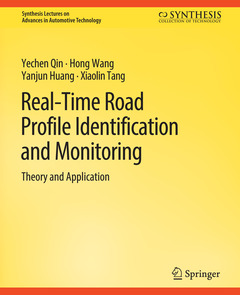Description
Real-Time Road Profile Identification and Monitoring
Theory and Application
Synthesis Lectures on Advances in Automotive Technology Series
Language: English138 p. · 19.1x23.5 cm · Paperback
Description
/li>Contents
/li>Biography
/li>
Ever stringent vehicle safety legislation and consumer expectations inspire the improvement of vehicle dynamic performance, which result in a rising number of control strategies for vehicle dynamics that rely on driving conditions. Road profiles, as the primary excitation source of vehicle systems, play a critical role in vehicle dynamics and also in public transportation. Knowledge of precise road conditions can thus be of great assistance for vehicle companies and government departments to develop proper dynamic control algorithms, and to fix roads in a timely manner and at the minimum cost, respectively. As a result, developing easy-to-use and accurate road estimation methods are of great importance in terms of reducing the cost related to vehicles and road maintenance as well as improving passenger comfort and handling capacity. A few books have already been published on road profile modeling and the influence of road unevenness on vehicle response. However, there is still roomto discuss road assessment methods based on vehicle response and how road conditions can be used to improve vehicle dynamics.
In this book, we use several generalized vehicle models to demonstrate the concepts, methods, and applications of vehicle response-based road estimation algorithms. In addition, necessary tools, algorithms, and methods are illustrated, and the benefits of the road estimation algorithms are evaluated. Furthermore, several case studies of controllable suspension systems to improve vehicle vertical dynamics are presented.





